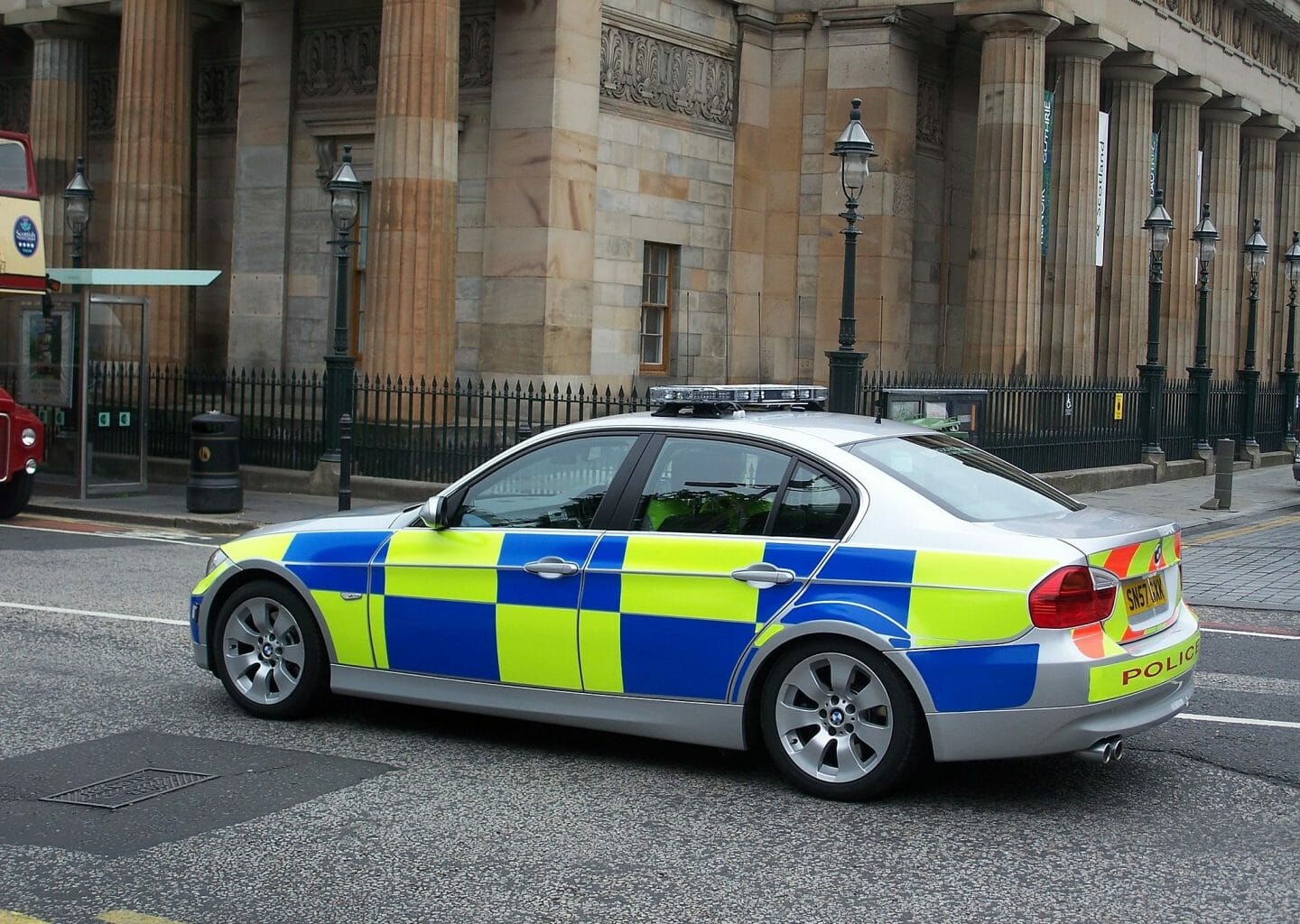The close links to covert police units in Scotland of a former detective probing undercover policing are revealed today by The Ferret, prompting critics to call into question the independence of a review by Her Majesty’s Inspectorate of Constabulary Scotland (HMICS).
Stephen Whitelock is part of the HMICS team working on a review into undercover policing in Scotland. But it emerged recently that he is a former detective who once managed a covert unit, a revelation that prompted questions over a conflict of interests on his part.
The Ferret can now reveal further details of Mr Whitelock’s extensive links to undercover policing, leading to renewed calls from politicians and campaign groups for the former officer to be removed from the HMICS team.
In response, both the Scottish Government and HMICS insist the review will be independent.
The HMICS probe into undercover policing was ordered by Justice Secretary Michael Matheson after the Home Office ruled out extending the Pitchford Inquiry to Scotland. HMICS is the public body that scrutinises Police Scotland.
The Pitchford Inquiry was established to look at undercover policing in England and Wales after a series of scandals surrounding officers working secretly with now disgraced Metropolitan Police units.
For decades, officers infiltrated peaceful protest groups across the UK and abused their powers, actions by some of the so-called ‘spycops’ that led to the Met Police being sued by women who had been duped into relationships.
When it emerged that some of the spycops also operated north of the border there were calls for Pitchford to be extended to Scotland. This proposal was supported by the Scottish Government, but the UK Government ruled it out.
Instead, the Scottish Government announced a separate HMICS review to look into the activities of spycops in Scotland.
Whitelock was deputy director of the specialist police force in charge of undercover activities, as reported recently. Covert policing, prior to the creation of the single force, was the responsibility of the Scottish Crime and Drug Enforcement Agency (SCDEA).
The SCDEA had its own “special operations” section that assisted undercover operations throughout the country and Mr Whitelock joined the SCDEA in 2008. He was appointed deputy director general in 2013 before retiring and becoming a lead inspector at HMCIS.
According to campaigners, the Undercover Research Group (URG) – which has been exposing police spies in the public interest and calling for a full public inquiry to be held in Scotland – Mr Whitelock has been “a key player in a network of officers” in and around Strathclyde Police intelligence units and the Scottish Crime and Drug Enforcement Agency over the last two decades.
Eveline Lubbers of URG said: “Time and again we discover that those officers asked to investigate the spycop scandal have themselves been significantly connected to undercover policing in their career.
“Though there is an argument for choosing people with knowledge of the issues, this scandal is fraught with the secrecy maintained by all those involved and overseeing.
“Thus, only truly independent investigators are capable of holding the wider public trust needed. Without a new start, there is no hope for transparency and accountability.”
Neil Findlay, the Labour MSP for the Lothians, said: “The more evidence that comes to light about Stephen Whitelock, the more I am convinced that he should not be allowed anywhere near the running of this inquiry.
“Stephen Whitelock appears to have been a key player in the deployment of undercover police officers in Scotland and has had a professional relationship with many of those involved. Given this it is impossible for him to remain involved in the review – if he does the review cannot be independent.”
URG said that Mr Whitelock’s career that make him one of the “worst possible choices” to oversee the review into undercover policing in Scotland”.
His links revolve around the crossing of personnel between the Strathclyde Police’s Crime Division Intelligence department and the SCDEA.
In both organisations, Mr Whitelock played an active role in overseeing the deployment of undercover staff, URG said, adding that he had significant contact both directly and indirectly with officers leading Special Branch in Strathclyde.
“In one sense Whitelock is the perfect person to do the review, as he was there in the middle of it all and knows all the key players,” URG said. “But to call such a set of conflict of interests ‘independent’ beggars belief, and is above all an insult to all those who were abused by spycops.”
Prior to joining the HMICS, Whitelock had a long career with Strathclyde police, having joined in 1978. He was a detective inspector in Glasgow in the 1990s dealing with serious crime. By 1996, he was Detective Chief Inspector and in charge of the force’s drug squad.
In 1997 he moved on to head the Force Intelligence Bureau where he also oversaw the Child Protection Unit. In 2000 he was a Superintendent running undercover police operations against fly-tippers.
In 2001, Whitelock was appointed Head of Intelligence for the SCDEA, where his deputy was DCI Gordon Meldrum. The Director General was James Orr, a former Assistant Chief Constable of Strathclyde (and ex-Head of Special Branch), while the Deputy Director was Philip McDonald, previously Deputy Head of Strathclyde Special Branch.
In 2003/2004 Whitelock returned to Strathclyde as Deputy Director of Intelligence, and around that time he attended Teesside University to study the role of an authorising officer for covert policing.
URG said that the head of Special Branch at that time was Detective Superintendent Johnny Gwynne, adding that as head of intelligence, Mr Whitelock would have worked closely with Special Branch, and with the Special Operations unit which oversaw and authorised covert operations within the Strathclyde area in general.
A number of subsequent leading officers such as Russell Dunn, a later head of Special Branch also served with Mr Whitelock at this time, a crucial period for the spycops saga, with Mark Kennedy (one of the most notorious spycops) visiting Scotland with colleagues for the G8 protests at the summit at Gleneagles – the largest known mobilisation of spycops in relation to a single event.
By February 2007, Mr Whitelock was Director of Intelligence as Detective Chief Superintendent until November 2008 when he transferred to the SCDEA. In 2010, he was head of the newly created Scottish Intelligence and Coordination Unit within the SCDEA.
In January 2013, Whitelock was appointed Deputy Director General; though in May that year he took up the position of Lead Inspector at HMICS.
HMICS defended Mr Whitelock’s role in the Scottish investigation despite the above links and did not dispute any of the above research by URG when presented with the information.
A spokesperson for HMICS said: “The review of Undercover Policing in Scotland will be personally led by Derek Penman, HM Chief Inspector of Constabulary in Scotland, who will be solely responsible for the final report and any findings or recommendations.
“He has considered this issue in detail and has measures in place to protect the overall integrity of the review. Mr Penman will draw on the experience and expertise of a number of people during this review, including Mr Whitelock and others from outwith HMICS who will be independent of policing in Scotland.
“He will ensure that all members of his review team are deployed appropriately into specific areas where there can be no potential conflict of interest.
“HMICS is working towards publishing our Terms of Reference for the Review of Undercover Policing in Scotland later this month.”
John Finnie, the Scottish Green Party MSP said: “Anyone appointed to lead a review of this nature should declare their level of knowledge of those subject to the enquiries and make a professional judgement as to whether their impartiality could be open to question.
“Disappointingly, it seems that in this instance even that very basic level of checking has not been applied.
“Rank and file cops are sick of being discredited on the back of this small, cavalier group of elites who pay scant regard to the rules, regulations and laws they so harshly judge their subordinates by.
“Let’s cut to the chase, the, “authorities,” have no wish to open this murky world of questionable legality, and zero morality, up to public inspection and political accountability.
“What better way to show contempt of this important matter of human rights that to keep this so-called, “review,” completely ‘in-house’.”
A Scottish Government spokesperson said: “We continue to believe that a single inquiry across the UK would be the best option for a comprehensive and coherent investigation into these matters.
“As the UK Government has refused our request for this, we have directed HMICS to carry out an independent review of undercover policing in Scotland.
“The review will be essential in gathering facts about existing and historical undercover policing activities, over the period the Scottish Parliament has had responsibility in this area, and will inform any future decisions we make.
“People can have full confidence that the HMICS review of undercover policing will be thorough and independent.”
Police Scotland said it would co-operate fully with HMICS’s review.
Lindsay Davies from Campaign Opposing Police Surveillance, a group of people who discovered they were targeted by spycops, said: “There is nobody less credible in all Scotland than this body of senior police, led by someone who would be investigating wrongdoing by his personal friends and colleagues.
“We had this response in England five years ago with a swathe of whitewash reports from the police and their satellite bodies telling us rogue officers made mistakes but everything was basically fine.
She continued: “Each one got rapidly discredited by fresh revelations of the huge, systemic nature of these counter-democratic tactics and units. In 2016 we are no longer dealing with mere suspicions, this is a proven victim and perpetrator situation.
“For the Scottish government to regress to letting police mark their own homework is an insult to everyone who was abused by these officers in Scotland. Why do they think their citizens deserve less access to truth and justice than the English?”
URG’s research can be viewed here.














